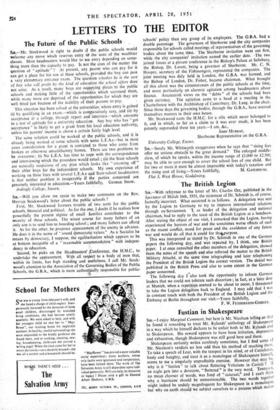The British Legion
SIR, With reference to the letter of Mr. Charles Orr, published in the Spectator of Ma"rch 16th, 1951, the statement of Dr. Schmidt is, of course, factually incorrect. What occurred is as follows. A delegation was sent by the Legion to Germany to try to improve international relations through ex-Servicemen. LI, as leader of the delegation and national chairman, had to reply to the toast of the British Legion at a luncheon. After stating the object of our visit, I remarked that the Legion, having experienced the horrors of war and the sometimes worse effects of such as the recent conflict, stood for peace and the avoidance of any future war and would do all that it could for thatipurpose.
This was interpreted as stated by Dr. Schmidt in one of the German papers the following day, and was repeated by, I think, one British paper. I at once consulted the other members of the delegation, showed them the notes of the speech and also referred the matter to the British Military Attaché, at the same time telegraphing and later telephoning the President of the British Legion the correct version. The denial was published in the British Press and also to some extent in the German paper concerned. The following day ealso took the opportunity to inform German leaders that we could not tolerate such distortion ; in fact, at a later dale at Munich, when a repetition seemed to be about to occur, I threatened to take the Legion delegition back to England. I may add that I was in constant touch with both the President of the British Legion and the Embassy at 'Berlin throughout our visit.—Yours faithfully,
F. W. FETHERSTON-GODLEY.


































 Previous page
Previous page